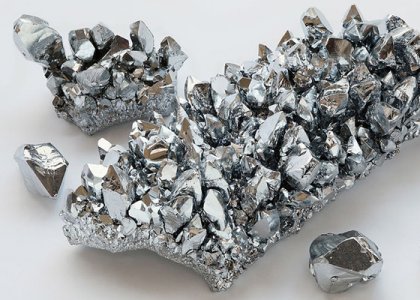General information about titanium

Technical characteristics
Titanium is a silvery metal with a bluish cast, remarkable for its light weight (4,507 g/cm3), it melts at t° 1660 °C and boils at 3260 °C. It is a fairly common element, its content in the Earth's crust is about 0.60%. It is the fourth most common constructional metal, behind only iron, magnesium and aluminum. The chemical symbol for Ti. Ti was isolated by Klaproth in 1789 but because of brittle impurities it did not find practical use for a long time. Titanium obtained in the twenties of the twentieth century by de Boer and Van Arkel iodide proved to be a technological and ductile metal with many valuable advantages that attracted the attention of engineers and technologists. Today, thanks to improvements in metallurgical technologies, titanium can be purchased at an affordable price.
General information about titanium
| J/(kg-degree) | MPa | Ohm-m | W/(m -degree) | kg/m3 | t °C | 1/degree |
|---|---|---|---|---|---|---|
| 0.586 | 8.2 | 1.12 | 8.37 | 4.45 | 20 ° | 1 |
Advantages
Titanium has a high specific strength and very high corrosion resistance. It is a valuable material in industries where lightweight and durable material is needed, primarily in aviation and missile construction. Titanium alloys have no alternative in the temperature range from 250°C to 600°C when magnesium and aluminum light alloys can no longer withstand the stresses. Owing to its resistance to corrosion in sea water, the metal is used extensively in shipbuilding to produce ship hulls, propellers, torpedoes, submarines, etcDisadvantages
Molten titanium actively interacts with atmospheric gases. It is quite difficult to separate it in the pure form; it is difficult to process, especially by cutting; it has a considerable cost price. Considerable difficulties are also connected with recycling of its wastes. Most titanium alloys are prone to hydrogen embrittlement. The antifriction properties of titanium are not high.
Buy, bargain price
Where to learn general information about titanium? Supplier Auremo specializes in the supply of rare and refractory metals,.will not only provide general information about titanium, but also offers to buy titanium today on favorable terms. Large selection in stock. Conformity with GOST and international quality standards, the price is optimal from the supplier. Buy today. Order the service "Callback" and manager of the company will contact you. Wholesale customers price - preferential.
Supplier
Auremo will provide general information about titanium and also offers to buy titanium on favorable terms. There is the widest choice of products in stock, the price - due to the technological features of production without the inclusion of additional costs. All products are certified. Optimal price from the supplier. Buy today. Read more general information about titanium on our site We are waiting for your orders. We have the best price-quality ratio for the whole range of products.







